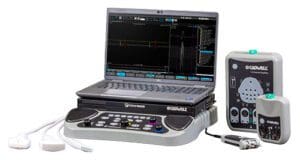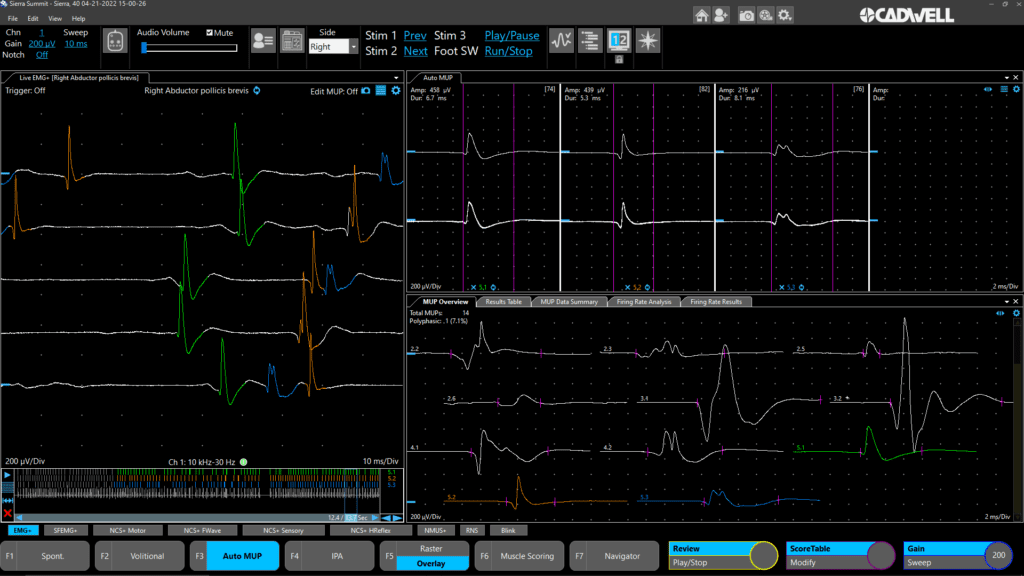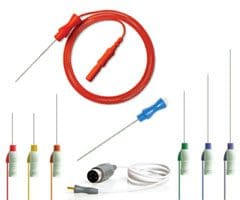Contact Us to SCHEDULE A DEMO
Electromyography Clinical Solutions
Use Sierra Summit® Electromyography (EMG) tests to diagnose muscle disorders and diseases. A variety of independent tests or combined techniques in Sierra® software offer a flexible and comprehensive toolkit for evaluating muscles and the nerve cells that control them.
Help detect neuromuscular disorders with electromyography
Sierra Summit helps you detect neuromuscular disorders with electromyography (EMG) tests that electrically or neurologically stimulate a muscle and record the responses with auditory and visual feedback. Sierra 4 software lets you run independent tests, or use combined techniques to strengthen findings, validate diagnoses, and improve treatment decisions.
Needle EMG
Record insertional and resting activity, including fasciculation and fibrillation potentials. Needle EMG can be used as a tool for diagnosing and researching neuromuscular diseases, motor control disorders, kinesiology, and biomedical engineering.
Surface EMG
Use surface electrodes to assess muscle activation from the surface of the skin above a superficial muscle.
Single Fiber EMG
Measure individual muscle fibers within a motor unit to help assess neuromuscular dysfunction that may be caused by disease, drugs, or poison.
EMG with NCS
EMG is often performed with nerve conduction studies (NCS), to assess sources of limb pain, weakness from spinal nerve compression, or neurologic injury or disorder.
EMG with Ultrasound
Combining EMG with ultrasound imaging can help the quality, success, and tolerability of EMG testing.
- Help precisely find a target while providing muscle activity information and assisting with motor point localization.
- Contribute to the clinical approach taken with patients with peripheral neuropathies
- Modify diagnostic and therapeutic paths, including surgeries
- Guide appropriate intervention and prevent unnecessary needle sticks
- Help improve overall patient outcomes
EMG with Ultrasound and Electrical Stimulation
Adding electrical stimulation to EMG with ultrasound helps precisely locate targets, and can help place the needle in the target muscle or adjacent to the target nerve for motor point localization or nerve blocks. Ultrasound helps confirm specific muscle selection, identify the size of the muscle and the longitudinal midline of the muscle for the proper electrode depth, and accurately insert and adjust the needle in target muscles.
Clinical indications for EMG/NCS with ultrasound include:
- Carpal tunnel syndrome
- Muscular dystrophy
- Intraneural ganglion cysts
- Peripheral nerve entrapments and tumors
- Neuropathies
- Nerve transections and lesions
- Neuromas
- Inflammatory myopathies
- Neurogenic muscle atrophies
- Nerve and muscle trauma
Build your own EDX clinical solution
Scalable Sierra Summit hardware and Sierra 4 software give you a variety of stimulators, amplifiers, and test protocols for scaling the EDX system your practice requires. The EMG+ protocol offers many innovative features not found on competitor devices to maximize clinical information and decrease exam time.



Needle Electrodes
Visit the Cadwell e-store for a wide variety of concentric, monopolar, and injectable needle electrodes for stimulating and recording with the Sierra Summit amplifiers.
Download materials, get software updates, and request hardware and software features
Shop for all the EMG electrodes and accessories you need
Explore Cadwell EDX products
The Sierra® family of products are the ideal solution for Chemodenervation, EMG, EPs, NCS, Ultrasound, and Electrodiagnostics in Urology.
Request an EMG, NCS, EP, and Ultrasound Demonstration
Product availability may vary between different countries and markets.
Please contact Cadwell for additional information.
